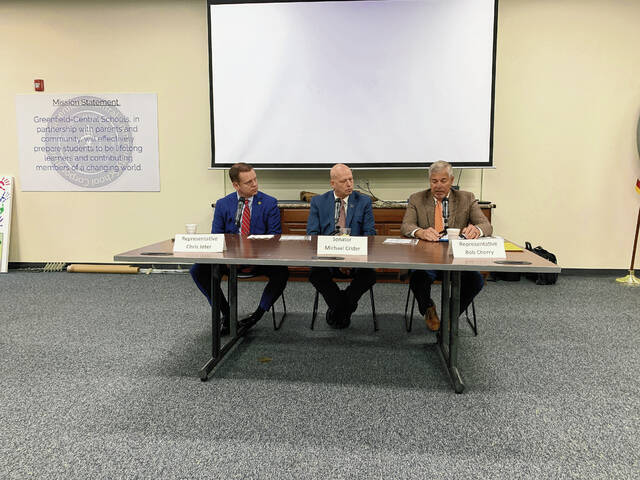
Indiana Rep. Bob Cherry, R-Greenfield, right, speaks at the Greenfield-Central Educational Services Center Tuesday morning as state Sen. Michael Crider, R-Greenfield, center; and state Rep. Chris Jeter, R-Fishers, listen on.
Mitchell Kirk | Daily Reporter
GREENFIELD — Addressing the audience gathered at the Greenfield-Central Educational Services Center, Indiana Rep. Bob Cherry, R-Greenfield, gave a succinct description of the state’s current legislative session.
“It’s never as good as we hope, and it’s never as bad as what they say,” he said. “That goes with all legislation.”
Cherry, state Sen. Michael Crider, R-Greenfield, and state Rep. Chris Jeter, R-Fishers, all of whose districts include parts of Hancock County, attended the Eggs &Issues Legislative Breakfast Tuesday morning organized by the Greenfield Area Chamber of Commerce. The lawmakers interacted with constituents and reflected on the Indiana General Assembly’s session as it draws to a close, which has included bills regarding tax cuts, COVID-19, a nursing shortage and more.
Cherry recalled the redistricting that occurred before the session that brought changes throughout the state. That includes Indiana House of Representatives District 54 containing Blue River Township in Hancock County’s southeastern corner, which has drawn an eight-way race in the upcoming Republican primary. One Democrat also seeks the position.
Crider, first elected to the Senate in 2012, has eight bills awaiting consideration from Gov. Eric Holcomb in a session he described as unusual.
“I don’t think I’ve ever experienced one where you just came in the first day and you felt like you were already running full speed,” Crider said.
As of Tuesday morning, the Senate had passed some 161 bills and the House had passed 105. About 70 had already headed to the governor.
Indiana’s substantial monetary surplus and the effect it’s had on bills was a topic of the breakfast’s discussion.
“The financial stability of this state is really something to be envied I think across the entire Midwest,” said Jeter, now in his second session.
The lawmakers said it’s allowed for bills that aim to provide a $125 credit toward Hoosiers’ state income taxes, repeal a utility receipts tax and reduce Indiana’s individual income tax from 3.23% to 3%, which Jeter said would be the largest income tax cut in state history.
“There’s a lot of things we could spend the money on, but at the same time we don’t want to grow government as you see it,” said Cherry, who’s served in the House of Representatives since 1998.
Crider said he’s heard from many members of the public that the government should be more active with its flush coffers. One of Tuesday’s attendees suggested investing more in state agencies, possibly improving the unemployment services that lacked amid COVID-spurred furloughs.
“I am somebody that’s very sympathetic to state agencies because I ran a state agency for a while,” Crider said, recalling his role as head of law enforcement for the Indiana Department of Natural Resources before becoming a state senator.
He went on to recall the financial reductions that occurred during former Gov. Mitch Daniels’ administration.
“Some of those cuts were pretty deep, and agencies are really still trying to dig their way out of the funding challenges, so I’ve been very vocal that I think before we do a lot of other things, we really need to take a review of the state agencies, what their needs are, making sure that we’re supplying those needs at least to the level that they can perform the functions that they even exist for,” he said.
Jeter co-authored House Bill 1001, which would prevent employers from imposing COVID-19 vaccinations on employees without providing exemptions for medical or religious reasons or immunity from the disease via a prior infection.
“Obviously there’s a lot of different opinions on this issue, so we really tried to strike the middle ground at something that was reasonable at upholding the ability of employers to do what they thought was best, but also protect the individual workers’ rights,” Jeter said.
The legislators also discussed House Bill 1003, which aims to address a statewide nursing shortage by streamlining how the profession is licensed.
An audience member questioned if the bill would push even more nurses toward much more lucrative travel nursing opportunities, when the goal should be to retain the health care workers in their communities.
Jeter said much of the reason behind that migration may be that there are more jobs than applicants, and that possibly the bill can ultimately help fill as many openings in the field as possible, including community-based ones.
“If we could try to provide some additional quality applicants into the pool, maybe we can solve that issue that way a little bit,” he said.
Crider said the state typically gets about 200 bills signed into law a year.
“We should be right on target for about that number again,” he said.
Then it’s eventually on to preparations for next year’s session, which will include the state’s biennial budget.




